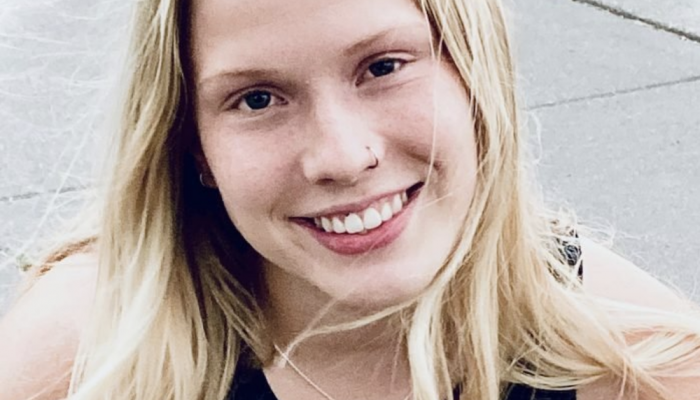I was a 28-year-old new mother, a hand-written list of vague symptoms in my hand, my husband by my side to provide what I hoped back then would be additional validity in my desire for acknowledgement that something was wrong with me.
“Are you tired?” the doctor asked, having given my list only a cursory glance.
What a question. I was the mother of a newborn baby. Of course I was exhausted.
“Go home, try and get some rest,” he suggested. “You’re young and healthy. You’ll bounce back.”
I felt frustrated and overlooked. Dismissed and embarrassed. I knew something more was wrong, but couldn’t get him to listen.
A few weeks later, I broke out in hives. I went to an allergist, feeling almost victorious having the proof not on a piece of paper but circling nearly every inch of my skin.
How can you dismiss me now, I thought?
But, after testing proved I had no obvious allergy, I was informed that the hives were benign and would resolve themselves in time. Nothing to worry about, really.
It wasn’t until a couple years later, after my second daughter was born, that a doctor finally listened to my symptoms and suggested that I might have depression. A few years after that, with the help of a therapist, I finally identified and addressed the generalized anxiety disorder that paired with my depression.
Finally, I got the help and support I needed. Over time, my physical symptoms dissipated.
My experience is part of the reason why I became a vocal advocate for my daughters’ health as they grew up. I never downplayed any symptom they had, trying always to balance taking their concerns seriously with my own anxious tendency to scare my whole family.
By advocating, I mean that I never let doctors send us home without a thorough examination. To the doctors’ occasional annoyance, I came prepared with questions, lists, and suggestions. I asked for thorough blood work. I was willing to switch doctors and get second and third opinions.
So, perhaps it sounds shocking to you that I completely missed my adult daughter’s anxiety for over two years. It sure surprises me.
Her symptoms started while she was still in high school. She would tell me about this “weird thing” that happened with her eyes. It was hard for her to describe, and perhaps even harder for me to repeat.
“It’s like I’m not there, like I can’t focus,” she said. “I feel spacey, like I’m watching myself through someone else’s eyes. I can’t get back to reality.”
It was a weird phenomenon, one that we couldn’t Google our way to understanding. But it only happened sporadically, so we both thought it must be eye fatigue or strain.
Sure enough, we took her to the eye doctor, and she needed glasses.
Aha, we thought. That was the issue. Fixed it!
Until it continued to happen.
The “eye” thing was the only noticeable symptom she had for about a year, though it continued to increase in frequency and duration. I asked her if she felt any overwhelming stress. She said no. I suggested she wear her glasses all the time and get more sleep, especially as she headed to college.
By the time she started her first year of college, the “eye thing,” as we started to call it, no longer happened sporadically but would last most of the day.
Other symptoms soon appeared. They, too, were vague and hard for her to describe—disorientation, a sense of not being fully present, a heightened focus on her own words and actions. Her heart rate spiked occasionally, causing her to feel like she couldn’t catch her breath, or like she was going to pass out. In fact, one time when she was teaching a dance class, she had to excuse herself, sit down, and take some time out before she could return. She lost trust in her body.
She began to mourn the life she had before these symptoms became such a big part of the story. Every day turned into a battle where she fought to find those rare moments of feeling like herself.
Her primary care doctor ordered lab tests and did a routine physical. Finding nothing concerning in the results but not quite dismissing us either, she referred us to a neurologist.
My daughter instantly began to suspect the worst. A tumor? Cancer? Epilepsy? Seizures? As we waited for the appointment a few weeks in the future, fear of her health consumed our every waking moment.
The neurologist performed some basic physical tests and ordered a CT scan and an EEG. We had to wait several days for the results, days that passed excruciatingly slowly for both of us. The tests all proved negative, which was a great relief. But we were no closer to an answer.
My daughter’s doctors, though they listened, continued to reassure us that nothing was seriously wrong, and that she looked healthy on paper. She looked healthy in person, too. None of her friends knew what was happening behind the scenes, nor would anyone who met her have imagined that this young, ambitious woman was anything other than the epitome of health and well-being.
I imagine that’s what I had looked like to my doctor, too, all those years ago, when my anxiety got overlooked.
My daughter’s symptoms began taking over larger and larger chunks of her life, forcing her to say no to activities that she really loved. She was beginning to think that she would never be free of these strange, disorienting symptoms. She tried to diminish her symptoms by telling herself that maybe they were normal, and that everyone feels a bit disoriented from time to time. She began to tell herself she was overreacting, or hyper-sensitive. She began to fear that it was all in her head.
I didn’t believe any of these things. I trusted her experiences. But I felt helpless.
Finally, during a visit with my spiritual guide (who, incidentally, I began seeing because of my own ongoing issues with anxiety), I brought up my daughter’s story.
It seemed odd to both of us that I’d never brought it up in any previous appointment.
Why hadn’t I?
I can only explain this omission by saying that my daughter’s symptoms had crept up so slowly, it was hard to measure how much they’d taken over her life until I told the story to someone else. By this time, my daughter was in the process of trying to figure out how she could live with these symptoms, and I was trying to figure out how to support her.
My spiritual guide suggested that since I had an anxiety disorder, it was likely that my daughter did, too—even though it looked nothing like mine. Some anxiety disorders are not necessarily connected with any event, she told me, and can come on anytime and anywhere.
She recommended we see a psychiatrist, where my daughter was diagnosed with panic disorder.
A few more appointments, some experimentation with medications, and today I can report that my daughter has largely returned to her old self, to our profound relief. She is only now truly recognizing how much energy she spent each day trying to manage her symptoms. How much she’d begun to limit herself and her outreach in life.
I’m not beating myself up (too terribly) about missing this, but I still can’t believe that I didn’t consider anxiety as the cause of her symptoms. And honestly, I can’t believe the doctors all missed it, too.
Maybe I missed my daughter’s anxiety, and so did the doctors, because her symptoms did not fit into a neat package.
Maybe I missed it, and so did the doctors, because she never said that she felt stressed, or was under too much pressure. In fact, she looked and acted like someone who had her life firmly under control.
Maybe I missed it, because anxiety for me is situational, while her symptoms were chronic.
Maybe I missed it, because there had been no major incident in her life—no death of a loved one or an accident—that might’ve pointed obviously to the onset of anxiety.
Even though I have anxiety, I am not a doctor, and am not qualified to diagnose it. But the doctors are, and they should have. Yet, not one single doctor ever brought up the possibility that my daughter might’ve had an anxiety disorder. This suggests to me that anxiety is still greatly misunderstood and under-diagnosed, even while it is more common than ever.
By telling this story, I’m hoping to reach anyone who is experiencing strange symptoms, especially the kinds of symptoms doctors are quick to dismiss as “just needing a little rest.” This message is for anyone who’s been told, “You’re young and healthy; you’ll bounce back.”
To you, I say, keep advocating for yourself. Fiercely. Trust yourself and your experiences. Pay attention to your symptoms. You’re not overreacting. It’s not all in your head.
Anxiety is a clever shape-shifter that enters people’s lives and bodies in different ways. As much as Western medicine has taught us that certain symptoms point to specific diseases, we need to remember that symptoms are merely messengers, pointing to an underlying imbalance. The symptoms don’t necessarily have to match a list.
Especially now, as mental health disorders are on the rise due to COVID-19, please don’t let strange or hard-to-describe symptoms keep you from demanding answers regarding your or your loved one’s health and well-being.
Help is out there. Keep pushing until you find it.







Read 4 comments and reply